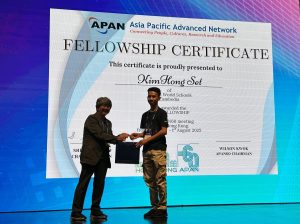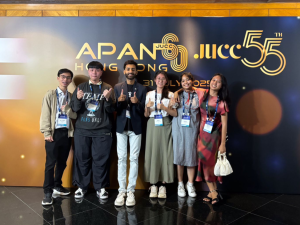As a medical student from Pakistan, I had the privilege of attending the Asia Pacific Advanced Network (APAN) 58 conference in Islamabad through a fellowship. This experience not only expanded my professional knowledge but also allowed me to connect with experts from around the world, forming lasting memories and fostering collaborations.
At APAN 58, I found myself immersed in a vibrant environment where researchers, scientists, and professionals from diverse fields came together to exchange ideas. I connected with like-minded individuals who shared a passion for innovation, and these interactions have since opened doors for potential collaborative opportunities. The sense of community that developed among the fellows, researchers, and experts was compelling, and I believe these relationships will play a role in my future endeavors.
Throughout the conference, I participated in various workshops and virtual sessions that significantly enhanced my understanding of advanced technologies in healthcare. Some of the key workshops included Software Defined Networking, Generative AI in Medicine, and Telemedicine, which provided valuable insights into the ways global experts are leveraging technology to address critical medical and research challenges. The discussions on Generative AI in Medicine, in particular, fascinated me with the potential to transform diagnostic procedures and streamline healthcare delivery.
Beyond knowledge, APAN 58 was also a source of inspiration. I was deeply moved by the stories of researchers working to improve healthcare access in underserved communities, using technology to bridge gaps between limited resources and critical needs. One story that stood out was from a participant working in rural Southeast Asia, using telemedicine to bring expert care to remote areas. These experiences reaffirmed my commitment to applying technology in ways that benefit society, especially in healthcare.
The conference offered valuable insights into networking technologies, cybersecurity, and regional ICT initiatives that are helping bridge digital divides. These learnings will guide my future research on antimicrobial resistance and my approach to collaborative projects.
On a personal level, APAN 58 boosted my confidence in presenting my ideas on an international platform and honed my networking skills, enabling me to connect with experts and peers from around the world. The diverse perspectives I encountered expanded my worldview and equipped me with new ideas to tackle global healthcare challenges.
I am sincerely grateful to Liana Jacinta for her leadership, the APAN organizers for this opportunity, and my fellow participants for their collaboration throughout the conference. Attending APAN 58 was a transformative experience, and I look forward to contributing to the global effort of driving innovation and collaboration across borders.








